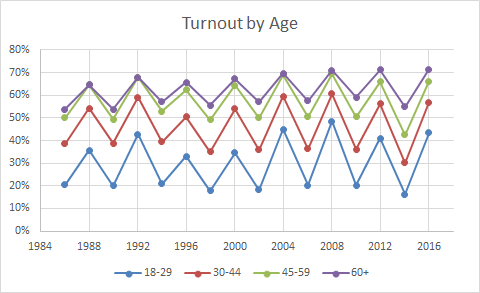Ahead of a critical midterm race, the American public is abuzz with speculation about how this election could impact key issues going into 2019: immigration, the opioid epidemic, health insurance, tax revision, and women’s health are front-and-center in voters’ minds as we near November.
But for senior voters, healthcare and Social Security remain top priority. And with just six weeks until we cast our ballots, we’re wondering if we can expect the same enthusiasm on these issues post-election as we do on so many others.
We know what the candidates are saying about Social Security, but will that translate into swift and meaningful legislative action once the celebrations are over and our new elected officials take office?
According to Sean Williams at The Motley Fool, we might not want to hold our breath.
That’s because in order to effect change in Social Security legislation, 60 votes are needed in the Senate for anything to move forward. The divisive partisan nature of today’s politics makes achieving 60 votes on anything contentious a grueling task without a supermajority—and it’s been 40 years since we’ve seen a supermajority in the U.S. Senate.
Though Williams notes anything can happen when it comes to elections and politics, it’s still very unlikely Republicans or Democrats will secure the 60 votes needed to push any Social Security amendment through the Senate. Add to that the wildly different views the two parties have on what constitutes good Social Security reform, and we’ve got the makings of another inactive two years for Social Security legislation in Congress.
BUT.
None of this is to say these elections don’t matter. Let’s not forget: when it comes to elections and politics, anything can happen. And when we’re talking about Social Security? It NEEDS to happen—and fast.
Party loyalties, partisanship, and political pettiness have no place in solving our Social Security funding problems. With no supermajority for either party in sight, it behooves our elected officials—whoever they may be after November—to prioritize finding a bipartisan solution to making Social Security work for everyone well into the future.
No matter how things pan out on the 6th, we need to let both our candidates and our sitting Congressmen know further inaction on Social Security is unacceptable. We’ve known about these problems since 1985. Thirty-three years of bickering and procrastinating have done nothing but allow our options for painless gradual reform to shrink.
Americans 60 and older compose slightly less than half of the electorate. And when it comes to voter turnout…

…there’s no question seniors hold a whole lot of the cards.
So as we examine our choices ahead of Election Day, we need to consider both a candidate’s stance on protecting Social Security and the level of importance they place on this issue. We want Congressmen who are willing to fight to push Social Security to the forefront of the discussion and work with their colleagues to find real solutions.
Thirty-three years of inaction is too long. Let your candidates know you expect progress. Write them. Email them. Call them. Shout them out on social media. Ask them what they’re planning to get do to ensure the retirement security of America’s seniors.
And above all: VOTE, VOTE, VOTE!





